
 |
|
|
|
#1
|
||||
|
||||
|
Great program Steve-O, would like to see more like out out in the world. There is so much essential theory that students should have. Some are here to teach, they should do just that.
Quote:
Regarding, "It gets good when it gets bad..." I disagree, IF we're windsurfers, the nastier the better, sans lightning as long as you and your gear can reasonably handle it. But, were not, we're kitesurfers. If you had ever been badly lofted by an excessive gust, we have more here than many other places in this hemisphere, we wouldn't be talking about this. Like it or not, our gear is not sufficiently safe in excessive squalls winds. From all the dozens of accidents I poured over and the few I've experienced there is NO doubt in my mind about this. Add too much wind and you get lofted and/or dragged or your kite stalls, snags something on you and the unequal lines drag you off at high rate of speed. You have wind more of the year in the Keys than any other place in Florida. How could one session be worth losing your health, mobility or your life? Quote:
__________________
FKA, Inc. transcribed by: Rick Iossi |
|
#2
|
||||
|
||||
|
Hey Brad,
Rick, you do care about blame as much as you do cure...how do you know what to cure without blame? Maybe it comes down to definitions, I see blame as going after someone or something with an intent to censure ("the rider's an idiot, don't be an idiot" I prefer "look for the following and take these steps to try to avoid it"). You are right, you have to know likely causes to develop a cure, if you are equating blame with cause. Quote:
Are you trying to tell me the guys out that day didn't know the dangers? That they didn't know about an approaching storm? Of course they did...thats why they were out! Yes, in a sense that is what I am saying. Saying a hazard exists is one thing (Storm winds are blowing, we're going), appreciating the nature of the threat and taking reasonable precautions is quite another. Here's an example, a real one. You have a tourist from the other side of the world. He doesn't know about high wind kiting, local conditions, hazards whatever. People warn him for a couple of days, he ignores them. It is blowing like stink, making the hazard apparent even to our tourist. Still, he DOESN'T APPRECIATE the nature or extent of the hazard, he blows it off. That was before he got lofted over a powerline and into the second story of a build then off to the hospital. There is a difference between acknowledging a hazard and appreciating what it can do to you and taking sensible steps to reduce the odds of getting trashed by it. This doesn't necessarily mean not riding for advanced riders but it does mean doing proper risk assessment and monitoring before and throughout the session. Remember a guy was killed just two days before in a seasonal squall not even a significant tropical storm with squalls hammering through all day long. Look Rick, we both care about everyone's safety...I don't want to see anyone get hurt any more than you do! I just feel the real problem lies deeper within the human nature of risk/reward. Like a lot of us, I've been doing action sports for a long time. I try to go at these activities in a thoughtful way with reasonable precautions dictated by conditions, training and good judgment. I even succeed at this, sometimes. I think a lot of this comes down to appreciating the hazard and going to the effort to reduce the odds of getting messed up through reasonable precautions. Otherwise it is like taking an ultralight up for a trip to Miami from Islamorada through something like Fay. Could be exciting and memorable but also potentially short.
__________________
Ride On. Brad Lange Seven Kiteboarding, Islamorada, Florida Keys www.sevensports.com 305-853-KITE Last edited by ricki; 08-22-2008 at 08:23 AM. |
|
#3
|
||||
|
||||
|
OttoNP makes a great point-
Predictability. As the weather gets less and less predictable...the danger gets greater. Is there a "Predictability Factor" in weather forecasting? Maybe our kite forecasts could read something like: E15-20 with a P5 (good forecast) or something like that to provide even more information about the quality of wind... In FL the forecast is isolated thunderstorms everyday so we don't even read that...
__________________
Ride On. Brad Lange Seven Kiteboarding, Islamorada, Florida Keys www.sevensports.com 305-853-KITE |
|
#4
|
||||
|
||||
|
Quote:
I don't see a day in the near term in which kitesurfers won't have to do our own weather interpretation to some degree. You can have a 3 mile diameter squall that will boost winds to 40 to 50 mph in seconds that is a point point on the area radar. Unless there are a bunch of them and even then at times in summer thermal squalls, the wx forecasters may not pick it up. So, a lot of this is up to us. Good news is that it isn't that hard or complex to form some useful impressions. Please read over: http://fksa.org/showthread.php?t=7043 and the top two posts at: http://fksa.org/forumdisplay.php?f=12 Dangerous weather isn't that hard to avoid if we try.
__________________
FKA, Inc. transcribed by: Rick Iossi |
|
#5
|
||||
|
||||
|
Hey Brad,
I apologize, I was responding to your post above this and screwed up hitting edit instead of quote right beside it. I had no intention to mess up your original post. I've tried to recover it but can't seem to do so. I feel particularly bad as your post had to have taken some time to put together. Sorry again.
__________________
FKA, Inc. transcribed by: Rick Iossi |
|
#6
|
||||
|
||||
|
I hope no one else has been messed up in all this squall activity. Seems like it has been going on for days. Checkout some images through TS Fay:
 Back on the 18th as the storm was just easing over Florida. Checkout those feeder bands, packed with squalls and moving at around 50 to 60 mph over the surface. Those are holes but how fast do they close?! 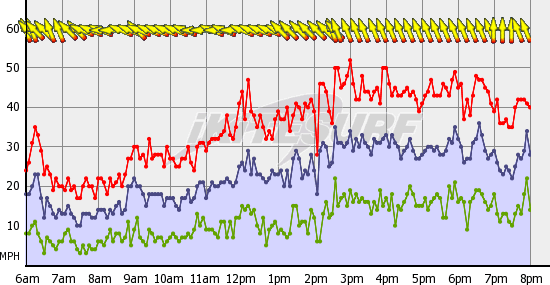 Matecumbe, August 18, 2008 This is some gusty stuff. If you were stationary as most of us are, you would feel these squalls rake over you on a regular basis. Seemed like twice an hour for a long time. Counting it looks like four times per hour or more in some cases. Even if you don't get blow into something hard, the gust lull cycles are a lot of work. Anyone up for rigging for 5 to 52 mph winds, uh what size should you setup? Kites like fairly steady winds, we make up the difference through handling and exertion for winds that are not. 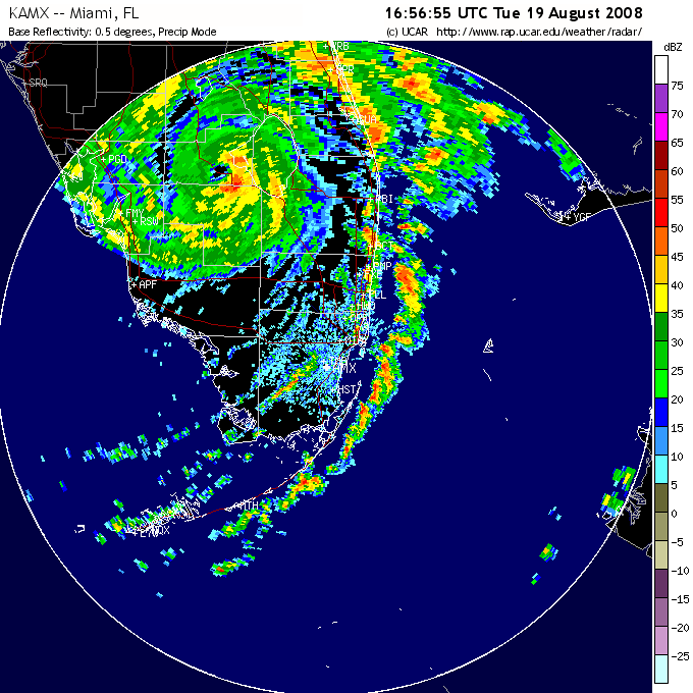 The next day, how much time do you think they had between getting bashed by squalls in those feeder bands in the Keys. The entire state gets treated to this sort of thing as the system sides north. Any of those red splotches could toast you with a 60 mph or even higher burst. The thing about wind stations is they're stationary and read local winds. Weather moves and effects large areas. You can have far more extreme or mild wind not too far away from the stations. 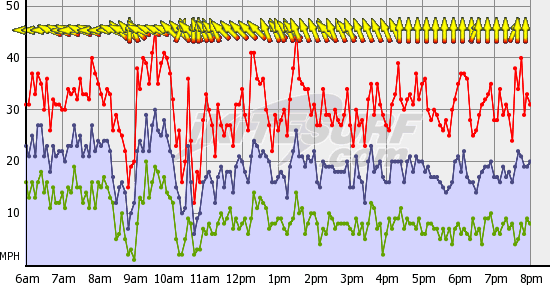 Hobe Sound, August 19, 2008 Yeah baby, where do I sign up to enjoy 3 to 45 mph winds with high speed direction changes? Count the number of spikes per hour and imagine having a nice kite up through all that. You can see it just yo yo'ed all day just like that. 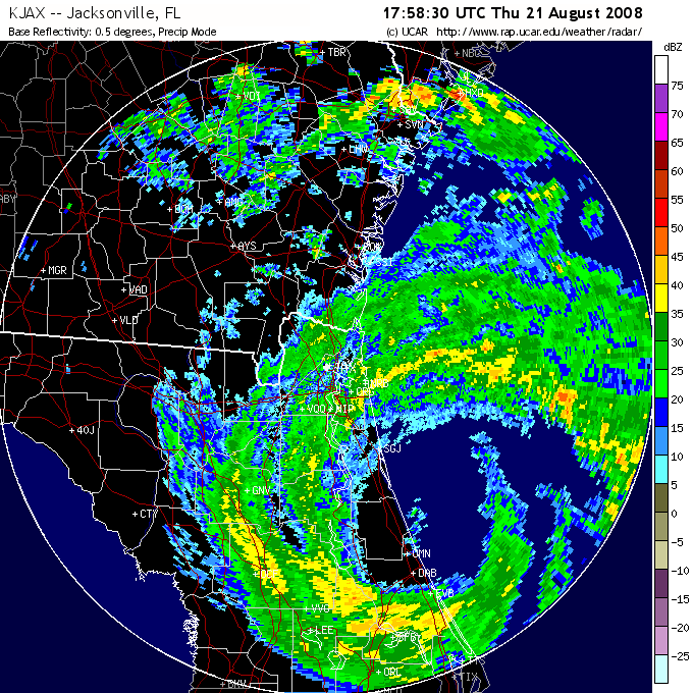 Days later and further north. The eye is getting pretty large. It's a hole right? How long does it stay over you and how free is it from squalls? Hard to say. 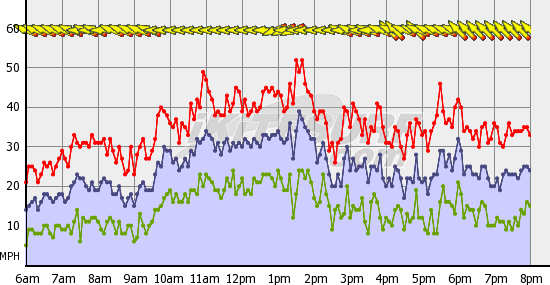 Getting up around Cocoa later in the week, still hammering through, tons of spike and lulls, for days! Tropical systems can be a trip, just make sure it isn't to the ER. There are few real surprises with these systems as far as generating local crappy conditions. It is more a matter of how bad and how long. Bottom line, tropical systems can locally make for bad kiting weather, lots of work and a good chance of getting slammed. Out of the area of the center, there are feeder bands, sometimes hundreds of miles long or even larger. No end of embedded storms in many of these convection bands. I was almost taken out by a storm that was centered 150 miles north and on the other coast of Florida. My feeder band was about 400 miles long so a 150 mile spacing amounts to nothing. That is if you're in the wrong place at the wrong time. AVOID Squalls.
__________________
FKA, Inc. transcribed by: Rick Iossi Last edited by ricki; 08-22-2008 at 04:02 PM. |
|
#7
|
||||
|
||||
|
Quote:
Thats ok Rick, I'm sure it was a mistake... I've read the above articles before...and suggested others do the same. Obviously I think weather prediction and squall avoidance is cruital to a kiter's survival...to imply otherwise is absurd and a little offensive seeing that I have dedicated almost a decade to teaching people safety. I'm trying to get deeper (and it's been difficult - probably due the limitations of a forum discussion) and discuss how we can help people, educate people, warn people when the traditional stuff doesn't work...because I don't think we're doing enough. It might be time to start another thread...
__________________
Ride On. Brad Lange Seven Kiteboarding, Islamorada, Florida Keys www.sevensports.com 305-853-KITE |
|
#8
|
|||
|
|||
|
Brad,
I found this post of yours and was wondering what kiteing fatallity you are talking about. Well, hopefully August will go down as an important month in kiting as there were some pretty bad accidents and a fatality in the Miami/Ft. Lauderdale area during tropical storm Fay. Although there was some ridable wind from the storm, there were definately some "DO NOT RIDE" conditions throuout the state that all kiters, regardless of experience, should avoid. As a new kiter, you MUST know when to go and more importantly when to NOT go out. There is a ton of information on this forum about weather prediction and safe kiting. Take advantage of it and take a certified lessons! We will be offerring all kinds of lesson packages, camps and cliniques this year that range from FREE to inexpensive. Take advantage, get connected, and learn how to rip for the long haul. __________________ Your own quote is "Although there was some ridable wind from the storm, there were definately some "DO NOT RIDE" conditions throuout the state that all kiters, regardless of experience, should avoid." but I know that your instructors rode in winds gusting over 50 mph during the same storm. I thought we were trying to show by example. Guess not. |
 |
|
|